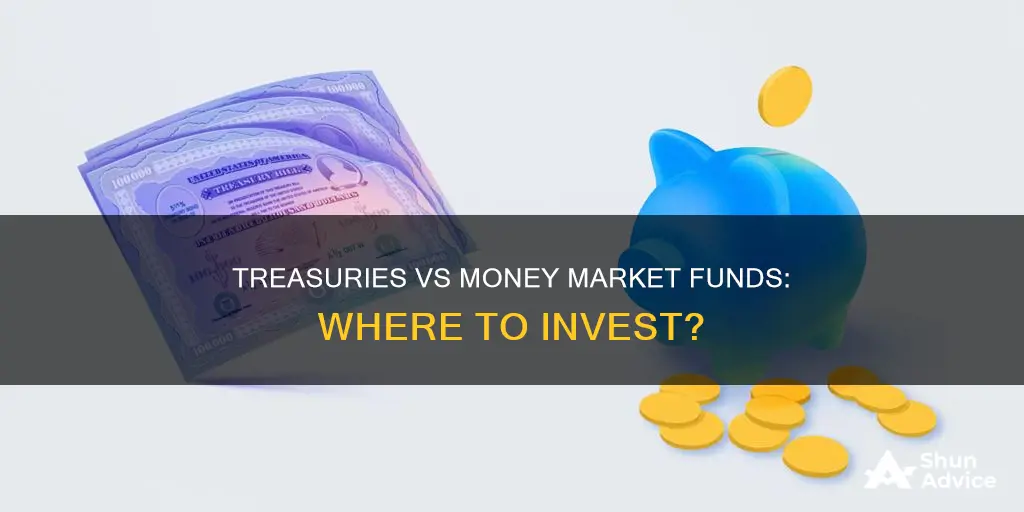
When it comes to investing, treasuries and money market funds are both considered safe, stable, and liquid options. However, there are key differences between the two that investors should be aware of when deciding where to allocate their capital. Treasuries, or Treasury bills (T-bills), are U.S. government debt securities with short-term maturity dates of one year or less. On the other hand, money market funds are a type of mutual fund that invests in short-term government debt securities and other high-quality, short-term debt instruments. While both options offer relatively low-risk investment opportunities, there are nuances to each that investors should consider when making decisions about their financial goals, risk tolerance, and market conditions.
| Characteristics | Values |
|---|---|
| Type of Investment | Mutual fund |
| Risk | Low |
| Returns | Low |
| Liquidity | High |
| Investment Horizon | Short-term |
| Income | Taxable or tax-exempt |
| Investment Instruments | Short-term, high-quality, low-risk debt securities |
| Examples of Investment Instruments | U.S. Treasuries, commercial paper, certificates of deposit |
What You'll Learn

Money market funds are a type of mutual fund
Money market funds are open-ended, meaning they can sell an unlimited number of shares to customers. The fund sells and redeems shares at a price equivalent to the net asset value (NAV), calculated daily, with a target of $1 per share.
Money market funds are not insured by the Federal Deposit Insurance Corporation (FDIC) and are subject to inflation and interest rate risks. They are, however, regulated by the U.S. Securities and Exchange Commission (SEC), which mandates stringent requirements for maturity, credit quality, diversification, and liquidity.
Money market funds are suitable for investors with short-term goals, a low tolerance for volatility, or those seeking a conservative investment option. They are also ideal for maintaining an emergency fund, covering larger expenses, or temporarily parking assets.
Plastic Factory Dreams: Funding Your Small Business Venture
You may want to see also

Money market funds are highly liquid
Money market funds are designed to offer investors high liquidity with a very low level of risk. They are ideal for investors who want to save for short-term financial goals, usually within three to five years. The funds are also suitable for those who want to maintain an emergency reserve or cover larger regular expenses.
Money market funds are also highly liquid due to their short-term nature. The duration of money market funds is typically a few months or less, making them subject to less interest rate risk than longer-maturing bond funds. This short duration also allows investors to quickly withdraw their money without incurring significant losses.
Additionally, money market funds offer check-writing privileges, providing investors with easy access to their funds. The funds are also regulated by the SEC, which requires them to comply with stringent maturity, credit quality, diversification, and liquidity standards.
In summary, money market funds are highly liquid due to the nature of their underlying investments, regulatory requirements, and the ease of access they provide to investors.
Pension Funds: Investing in the Top 100 Companies for Secure Returns
You may want to see also

Money market funds are low-risk
Money market funds are a type of mutual fund that invests in highly liquid, short-term debt instruments. They are considered extremely low-risk investments.
Money market funds are a safe avenue for investing in secure and highly liquid, cash-equivalent, debt-based assets using smaller investment amounts. They are characterised as low-risk, low-return investments. Money market funds are insured by the Securities Investor Protection Corporation (SIPC) and are considered relatively safe investments.
Money market funds are a type of fixed-income mutual fund that invests in highly liquid, short-term debt. They are considered low-risk because they invest in low-risk instruments like government-backed securities. Money market funds aim to maintain a stable $1 net asset value (NAV) per share and are less risky than other investment types like stocks or bonds.
Money market funds are a good option for those saving for short-term goals or building their emergency savings. They are also a good choice for those who want to park their cash temporarily before investing elsewhere or making an anticipated cash outlay.
Money market funds are not suitable for long-term investment goals like retirement planning because they don't offer much capital appreciation. They are also not insured by the Federal Deposit Insurance Corporation (FDIC).
Small-Cap Funds: Invest Now or Miss Out?
You may want to see also

Money market funds are not suitable for long-term investment goals
Money market funds are a type of mutual fund that invests in highly liquid, short-term debt instruments. They are intended as a short-term, liquid investment, providing modest income through interest. Money market funds are also sensitive to interest rate fluctuations, which can impact their overall returns.
For example, during the decade from 2000 to 2010, short-term interest rates hovered around 0%, leading to significantly lower returns for money market fund investors compared to previous decades. Additionally, the quantitative easing measures implemented by central banks following the 2008 financial crisis resulted in low-interest rates and diminished returns from money market funds.
While money market funds can be a good option for investors seeking a safe, short-term place to park their cash, they may not be the best choice for those seeking long-term capital growth. The low returns and lack of capital appreciation make them less ideal for retirement planning or other long-term financial goals.
It's important to note that money market funds are different from money market accounts (MMAs), which are a type of savings account offered by banks and credit unions. MMAs are typically insured by the Federal Deposit Insurance Corporation (FDIC) and may offer higher interest rates than regular savings accounts, making them more suitable for long-term savings.
A Beginner's Guide to Investing in Mutual Funds via HDFC Demat
You may want to see also

Money market funds are insured by the Securities Investor Protection Corporation (SIPC)
The SIPC has recovered billions of dollars for investors over the years. It steps in when a brokerage firm fails financially and assets are missing from customer accounts. It protects customer assets when a SIPC-member brokerage firm fails financially.
Money market funds are considered a type of mutual fund that invests in highly liquid, near-term instruments. These funds are intended to offer investors high liquidity with a very low level of risk. Money market funds are also known as money market mutual funds.
The SIPC provides up to $500,000 in total coverage per customer for lost or missing assets of cash and/or securities from a customer's accounts held at the institution. Up to $250,000 of that total can be applied to protect cash within a customer's account that is not yet invested in securities.
It is important to note that SIPC protection is limited. It only protects the custody function of the broker dealer, which means it works to restore customers' securities and cash that are in their accounts when the brokerage firm liquidation begins. The SIPC does not protect against the decline in value of securities or losses due to a broker's bad investment advice.
Money market funds are covered by the SIPC, but they are not insured by the Federal Deposit Insurance Corporation (FDIC). Money market funds are considered relatively safe investments and are a good option for investors seeking high liquidity and low risk.
IRA Investment Strategies: Where to Invest for Maximum Returns
You may want to see also
Frequently asked questions
Treasuries are US government debt securities with short-term maturity dates of one year or less. Money market funds are a type of mutual fund that invests in short-term government debt securities (like treasuries, commercial paper, or certificates of deposit).
Money market funds are considered a safe, low-risk, and stable investment option. They are highly liquid and provide better returns than bank accounts. They are also good for parking money temporarily before investing elsewhere.
Money market funds have lower potential returns compared to other investment options and may have minimum balance requirements. They are also not ideal for long-term investment goals like retirement planning as they offer little capital appreciation.
Money market funds are considered safe during a recession as they can protect your assets and offer liquidity. However, they may not be the best option for long-term growth.







